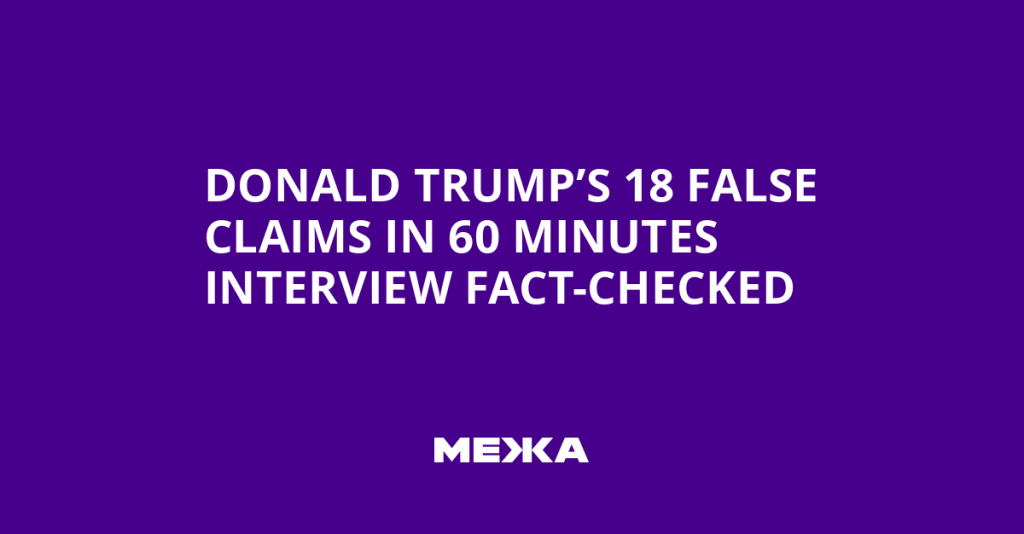Listen to the article
Former President Donald Trump made numerous false claims during his recent “60 Minutes” interview, with fact-checkers identifying at least 18 misleading statements on topics ranging from the economy to foreign policy.
CBS, along with independent fact-checking organizations, systematically debunked Trump’s assertions about the 2020 election, economic indicators, and international conflicts. The interview revealed a pattern of misrepresentation that has characterized much of Trump’s public messaging since leaving office.
On the economic front, Trump incorrectly claimed that food prices have “fallen” under his administration. Government data tells a different story, showing consistent increases across many food categories in recent years. Consumer Price Index figures from the Bureau of Labor Statistics demonstrate that while the rate of food inflation has slowed, prices remain significantly higher than pre-pandemic levels, with many Americans still feeling the pinch at grocery stores.
When discussing inflation more broadly, Trump asserted it was “2% or lower,” contradicting official statistics that place the annual inflation rate closer to 3%. This discrepancy highlights a tendency to downplay economic challenges that emerged during his presidency and continued afterward.
“No, you are mistaken. Food prices rose under Biden. They are falling now. Aside from beef, which we’re working on, we can fix this very quickly,” Trump claimed during the interview, a statement that misrepresents the actual trajectory of food costs according to government data.
Investment figures cited by Trump also failed to align with economic reality. His claim that “the U.S. is currently investing $17 trillion” significantly overstates actual investment levels, according to economic analysts. Such exaggerations appear designed to paint a more favorable picture of economic performance than objective metrics support.
Trump’s characterization of tariff policies similarly misrepresented their economic impact. While he maintained that foreign countries pay tariffs on goods exported to the United States, the financial burden actually falls on U.S. importers, who often pass those costs to American consumers. This misrepresentation obscures the real economic consequences of his trade policies during his administration.
On international affairs, Trump referred to “eight wars” currently underway, though several conflicts on his list don’t meet the definition of war or mischaracterize ongoing situations. Foreign policy experts note that this inflated count seems calculated to create a sense of global chaos under the current administration.
The former president also significantly exaggerated the amount of U.S. aid provided to Ukraine in its defense against Russian aggression. Official government records show that actual assistance figures fall well below Trump’s stated amounts, raising questions about his command of foreign policy details.
One particularly unusual claim emerged when Trump stated, “Each of these ships you see that were destroyed takes 25,000 Americans away because of drugs.” This statement, attributed to the Brennan Center for Justice in the interview transcript, appears to conflate maritime interdiction efforts with drug overdose statistics in a way that doesn’t align with public health data.
Legal experts also took issue with Trump’s characterization of the Insurrection Act and other constitutional matters discussed during the interview. His interpretations of presidential authority and legal precedents contained significant inaccuracies that could mislead viewers about the boundaries of executive power.
The “60 Minutes” interview represents the latest instance of fact-checkers working to correct the record on Trump’s statements as the political season intensifies. Media watchdogs note that the volume and persistence of false claims present ongoing challenges for journalists seeking to provide accurate information to the public.
As voters prepare for upcoming elections, the interview underscores the importance of scrutinizing political rhetoric against verifiable data from neutral sources such as government statistics, academic research, and established news organizations.
Verify This Yourself
Use these professional tools to fact-check and investigate claims independently
Reverse Image Search
Check if this image has been used elsewhere or in different contexts
Ask Our AI About This Claim
Get instant answers with web-powered AI analysis
Related Fact-Checks
See what other fact-checkers have said about similar claims
Want More Verification Tools?
Access our full suite of professional disinformation monitoring and investigation tools




6 Comments
Wow, 18 false claims in a single interview – that’s quite a record, even for Trump. It’s concerning to see this pattern of misrepresentation from a former president. I wonder if he’s aware of the disconnect between his assertions and the actual economic data.
I agree, the discrepancies on inflation and food prices are particularly troubling. It’s important for public figures to be held accountable for the accuracy of their statements, especially on important economic issues.
As someone interested in mining and commodities, I’m curious to see if Trump made any false claims related to those sectors. Reliable data and transparency are so important, especially in industries like energy and resources.
That’s a good point. It would be worth examining if any of his statements on things like energy, minerals, or mining were inaccurate. Fact-checking across the board is necessary to maintain public trust.
It’s disappointing to see a former president making so many misleading claims, especially on core economic indicators like inflation and food prices. This kind of rhetoric can be very damaging to public discourse and trust in institutions.
You’re right, factual accuracy from leaders is crucial. I hope this interview serves as a wake-up call for Trump to be more diligent about verifying his statements before making them publicly.